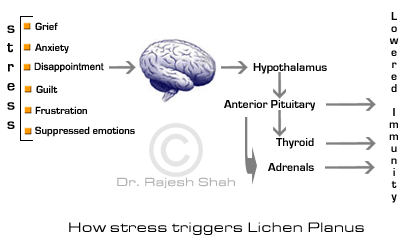Causes of Lichen Planus
Lichen Planus is found to be an immunologically mediated disease. The exact cause of Lichen Planus is not very clearly understood. Some triggers have been found that are clinically found to be responsible for Lichen Planus. It is one of those conditions where the exact cause remains unknown to the date. There are theories. In some cases, there are obvious links with the facts, such as
1. Modern Medicines
Certain modern medicines, such as non-steroidal anti-inflammatory painkillers (NSAID), antihypertensive medicines, amalgamated dental filling, etc., are known to induce Lichen Planus, which has a tendency to persist despite the discontinuation of the said medicines.
It may be of interest to list the common modern medicines that are known to induce Lichen Planus:
- NSAIDs (Non-steroidal anti-inflammatory drugs)
- Tetracycline
- Captopril
- Propranolol
- Sulfonamide
- Dapsone
- Furosemide
- Chloroquine
- Penicillamine
- Methyldopa
- Enalapril
- Allopurinol (anti-gout medicine)
2. Chemical Contact
Contact with certain chemicals (paraphenylenediamine), drugs (Arsenic compounds, certain metals such as Gold, Bismuth, and Quinacrine), exposure to light by photography development, etc.
3. Stress Leads to Lichen Planus
In our in-depth studies, we have observed that certain intense and prolonged emotional stress such as anxiety, shock, traumatic childhood, sadness, disappointment, failure, humiliation, etc. often initiate the process of Lichen Planus. Intense stress is likely to trigger some immunological processes that lead to the development of Lichen Planus. The exact mechanism is not yet understood. Stress has been found to be an important trigger in many cases, but not all.

It may be noted that this information is derived from the study at our center and may not be found in the standard dermatological textbooks.
4. Genetic Causes for Lichen Planus
Hereditary tendency. We have observed Lichen Planus running in family. However, it is not a rule that if you have Lichen Planus, your children will necessarily have it. Also, it is not a rule that every patient having Lichen Planus must have their parents or relatives with the same disease. It is observed that there is some autoimmune disease such as Lichen Planus, eczema, cancer, psoriasis, etc. in the family, suggesting a genetic link.
5. Lichen Planus and Hepatitis:
Some of the latest studies have shown a co-association of Lichen Planus with a rare variety of Hepatitis-C. It may be noted that the exact connection and causative link have not been established between the two entities. It may be noted that patients with Hepatitis C have some proneness to develop Lichen Planus; the reverse is not true.
6. Allergic component that leads to Lichen Planus
The studies have indicated the presence of certain cells, called HLA A-3 cell markers, suggesting immunological and allergic links. This requires being explored further.
 (4).gif)
Written & Approved by-
Dr. Rajesh Shah
M.D. (Hom.)